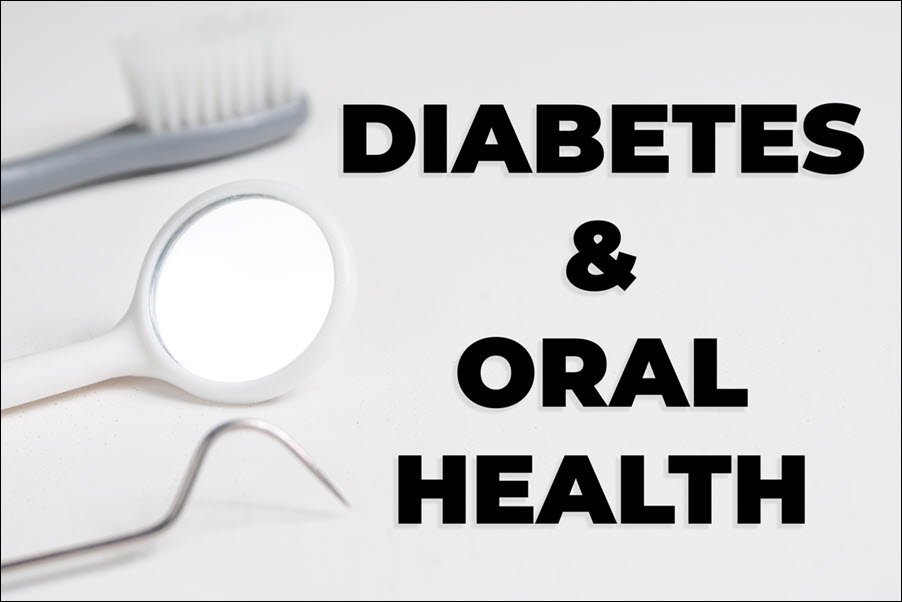Good oral care plays a vital role in managing diabetes. High blood sugar increases the risk of gum disease and tooth decay. Poor oral health worsens diabetes by raising blood sugar levels and increasing inflammation. Gum infections make it harder to control glucose levels, creating a harmful cycle. Proper brushing, flossing, and regular dental checkups reduce plaque and improve gum health. Healthy gums support better blood sugar control and improve overall health. Understanding the link between oral care and diabetes helps prevent complications and may even increase longevity. Let’s explore why good oral hygiene is essential for managing diabetes and improving health.
How Diabetes Affects Oral Health
 High blood sugar levels increase bacteria growth and plaque buildup. Increased plaque causes gum inflammation and increases the risk of periodontitis. Diabetes reduces the body’s ability to fight infections, making gum disease harder to treat. Dry mouth, caused by reduced saliva flow, increases tooth decay and mouth sores. Poor blood circulation weakens gum tissue, slowing healing after dental work. Higher glucose levels increase the severity of oral infections and inflammation. Gum disease makes it harder to control blood sugar, creating a harmful cycle. Managing blood sugar levels improves gum health and reduces inflammation. Stronger gums improve overall oral function and comfort.
High blood sugar levels increase bacteria growth and plaque buildup. Increased plaque causes gum inflammation and increases the risk of periodontitis. Diabetes reduces the body’s ability to fight infections, making gum disease harder to treat. Dry mouth, caused by reduced saliva flow, increases tooth decay and mouth sores. Poor blood circulation weakens gum tissue, slowing healing after dental work. Higher glucose levels increase the severity of oral infections and inflammation. Gum disease makes it harder to control blood sugar, creating a harmful cycle. Managing blood sugar levels improves gum health and reduces inflammation. Stronger gums improve overall oral function and comfort.
Gum Disease and Blood Sugar Control
Gum disease increases inflammation, which raises blood sugar levels. Inflamed gums release harmful chemicals that increase insulin resistance. Periodontitis causes deep gum pockets, allowing bacteria to spread into the bloodstream. This triggers an immune response that increases blood sugar. Treating gum disease reduces inflammation and improves glucose control. Scaling and root planing remove plaque and tartar from beneath the gums. Improved gum health strengthens the immune system and supports better diabetes control. Healthier gums reduce sensitivity and improve chewing comfort. Reduced inflammation makes it easier to stabilize blood sugar levels. Treating gum disease supports long-term diabetes management and better oral health.
Preventing Oral Infections and Tooth Decay
High blood sugar increases the risk of oral infections and cavities. Bacteria feed on sugar, producing acids that weaken tooth enamel. Reduced saliva flow increases plaque buildup and bacterial growth. Proper brushing and flossing remove plaque and reduce cavity risk. Fluoride toothpaste strengthens enamel and protects against decay. Antibacterial mouthwash reduces harmful bacteria and improves breath freshness. Regular dental checkups catch early signs of infection and tooth decay. Treating cavities early prevents tooth loss and gum recession. Reduced infection risk improves overall oral comfort and blood sugar stability. Stronger teeth support better chewing and digestion.
Managing Dry Mouth and Sensitivity
Diabetes reduces saliva production, causing dry mouth and increased sensitivity. Saliva protects teeth by neutralizing acids and washing away food particles. Dry mouth increases plaque buildup, leading to cavities and gum disease. Drinking more water improves moisture levels and reduces dryness. Sugar-free gum and lozenges stimulate saliva production and improve oral comfort. Avoiding alcohol and smoking reduces dry mouth symptoms. Dentists recommend fluoride treatments and special mouthwashes to protect enamel and reduce sensitivity. Better saliva flow strengthens enamel and reduces bacterial growth. Improved moisture levels increase chewing comfort and reduce gum irritation. Managing dry mouth improves overall dental health.
Benefits of Regular Dental Checkups
Regular dental checkups prevent oral problems and support better diabetes control. Dentists detect early signs of gum disease and tooth decay. Professional cleanings remove plaque and tartar, reducing gum inflammation. Deep cleaning (scaling and root planing) treats periodontitis and improves gum attachment. Dentists provide fluoride treatments to strengthen enamel and prevent cavities. Regular checkups also help monitor oral infections and dry mouth symptoms. Early detection of dental issues prevents complications and reduces the risk of tooth loss. Consistent dental care supports blood sugar control and improves overall health. Stronger teeth and gums increase long-term dental stability and comfort.
How to Improve Oral Health with Diabetes
Brush twice daily with fluoride toothpaste to remove plaque and strengthen enamel. Floss daily to clean between teeth and reduce gum inflammation. Use an antibacterial mouthwash to kill bacteria and freshen breath. Limit sugary snacks and drinks to reduce plaque buildup. Stay hydrated to improve saliva flow and reduce dry mouth. Schedule dental checkups every six months to catch and treat problems early. Quit smoking and reduce alcohol intake to improve gum health and healing. Managing blood sugar levels improves gum health and reduces oral complications. Consistent care strengthens teeth and supports overall health.
Good oral care is essential for managing diabetes and improving overall health. High blood sugar increases the risk of gum disease and tooth decay. Gum infections worsen blood sugar control and increase inflammation. Proper brushing, flossing, and regular dental checkups reduce plaque and improve gum health. Treating gum disease improves glucose control and strengthens the immune system. Managing dry mouth and sensitivity increases oral comfort and reduces cavities. Consistent dental care supports blood sugar stability and long-term oral health. Stronger teeth and gums improve chewing, digestion, and overall well-being. Investing in good oral care ensures better diabetes management and a healthier smile.

